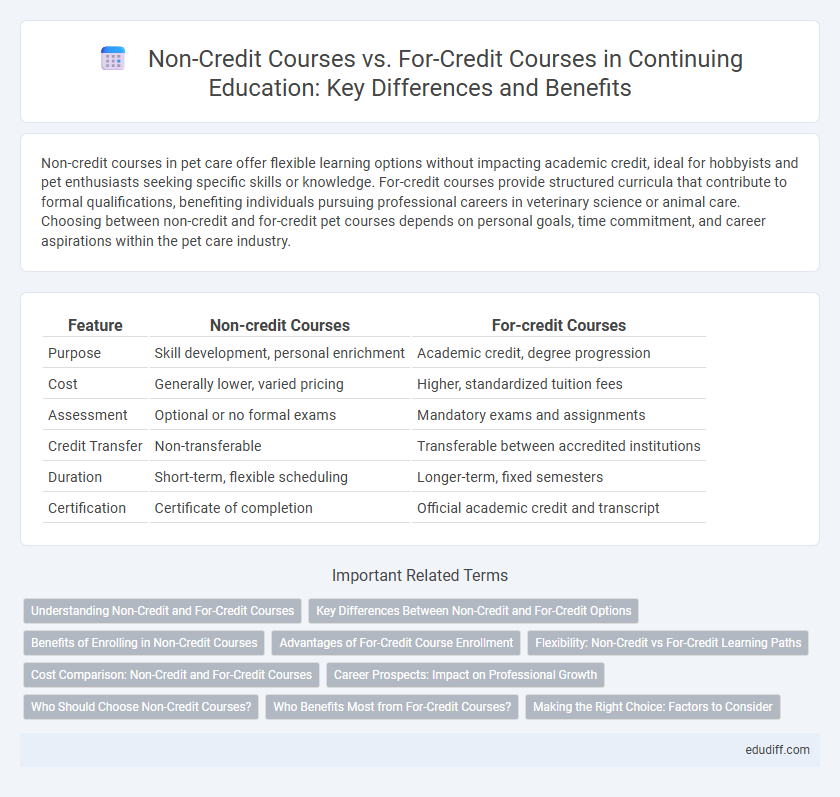Non-credit courses in pet care offer flexible learning options without impacting academic credit, ideal for hobbyists and pet enthusiasts seeking specific skills or knowledge. For-credit courses provide structured curricula that contribute to formal qualifications, benefiting individuals pursuing professional careers in veterinary science or animal care. Choosing between non-credit and for-credit pet courses depends on personal goals, time commitment, and career aspirations within the pet care industry.
Table of Comparison
| Feature | Non-credit Courses | For-credit Courses |
|---|---|---|
| Purpose | Skill development, personal enrichment | Academic credit, degree progression |
| Cost | Generally lower, varied pricing | Higher, standardized tuition fees |
| Assessment | Optional or no formal exams | Mandatory exams and assignments |
| Credit Transfer | Non-transferable | Transferable between accredited institutions |
| Duration | Short-term, flexible scheduling | Longer-term, fixed semesters |
| Certification | Certificate of completion | Official academic credit and transcript |
Understanding Non-Credit and For-Credit Courses
Non-credit courses provide learning opportunities without contributing toward a formal degree or certification, often appealing to adults seeking skill development or personal enrichment. For-credit courses are integral to academic programs and count toward degree requirements, offering academic credit recognized by accredited institutions. Understanding the distinctions helps learners select courses aligned with their educational goals and career aspirations.
Key Differences Between Non-Credit and For-Credit Options
Non-credit courses typically offer flexible scheduling and focus on skill development without contributing to an academic degree, while for-credit courses are structured to fulfill graduation requirements and impact a student's GPA. Non-credit options often cater to lifelong learners or professionals seeking certification, whereas for-credit courses serve matriculated students aiming for formal academic progress. The primary distinction lies in accreditation, with for-credit courses providing transferable credit recognized by educational institutions.
Benefits of Enrolling in Non-Credit Courses
Enrolling in non-credit courses offers flexibility for learners seeking skill enhancement without the pressure of grades or formal assessments. These courses provide access to specialized knowledge and practical expertise tailored for personal or professional growth. Non-credit courses often have lower costs and shorter durations, making education more accessible and convenient for diverse learners.
Advantages of For-Credit Course Enrollment
For-credit course enrollment offers significant advantages, such as earning academic credits that contribute directly toward a degree or certification, ensuring measurable progress within an educational program. These courses often provide rigorous assessments and structured curricula, fostering deeper knowledge acquisition and skill development. Furthermore, successful completion of for-credit courses enhances transcripts, improving future academic or professional opportunities.
Flexibility: Non-Credit vs For-Credit Learning Paths
Non-credit courses offer greater flexibility with self-paced schedules and open enrollment, accommodating learners balancing work or personal commitments. For-credit courses adhere to structured timelines with fixed start and end dates, requiring consistent attendance and deadlines. This distinction allows non-credit learning paths to prioritize accessibility, while for-credit paths emphasize academic rigor and progression toward degrees.
Cost Comparison: Non-Credit and For-Credit Courses
Non-credit courses generally have lower tuition fees compared to for-credit courses, making them a cost-effective option for skill development without the pressure of academic grading. For-credit courses often include additional expenses such as registration, textbooks, and lab fees, contributing to a higher overall cost. Evaluating the total investment in terms of tuition and associated fees helps learners determine the best financial approach for their educational goals.
Career Prospects: Impact on Professional Growth
Non-credit courses offer flexibility and skill enhancement without formal accreditation, making them ideal for professionals seeking immediate application in the workplace or career pivoting without committing to extended programs. For-credit courses provide recognized qualifications that enhance resumes and open doors to advanced career opportunities, often required for professional certifications and higher education. Employers increasingly value a combination of both, where non-credit courses demonstrate ongoing learning and adaptability, while for-credit courses confirm foundational knowledge and formal competency.
Who Should Choose Non-Credit Courses?
Non-credit courses are ideal for lifelong learners, professionals seeking skill enhancement, and individuals exploring new subjects without the pressure of grades or formal assessments. These courses offer flexibility and affordability for those wanting personal enrichment or career development without committing to a degree program. Non-credit courses also suit learners aiming to build competencies for immediate application in the workplace or daily life.
Who Benefits Most from For-Credit Courses?
For-credit courses primarily benefit students seeking formal academic recognition, career advancement, or transfer credits towards degree programs. These courses offer structured curricula aligned with accreditation standards, making them ideal for individuals aiming to meet degree requirements or professional certification criteria. Professionals pursuing licensure or academic credentials also find for-credit courses essential for demonstrating mastery and earning formal qualifications.
Making the Right Choice: Factors to Consider
Evaluate personal goals, time commitment, and career aspirations when deciding between non-credit and for-credit courses; non-credit courses offer flexibility and skill development without GPA impact, while for-credit courses provide academic credit essential for degree progression. Consider accreditation status and potential transferability of credits to ensure alignment with long-term educational objectives. Assess cost differences and available financial aid options to optimize investment and maximize learning outcomes.
Non-credit Courses vs For-credit Courses Infographic

 edudiff.com
edudiff.com